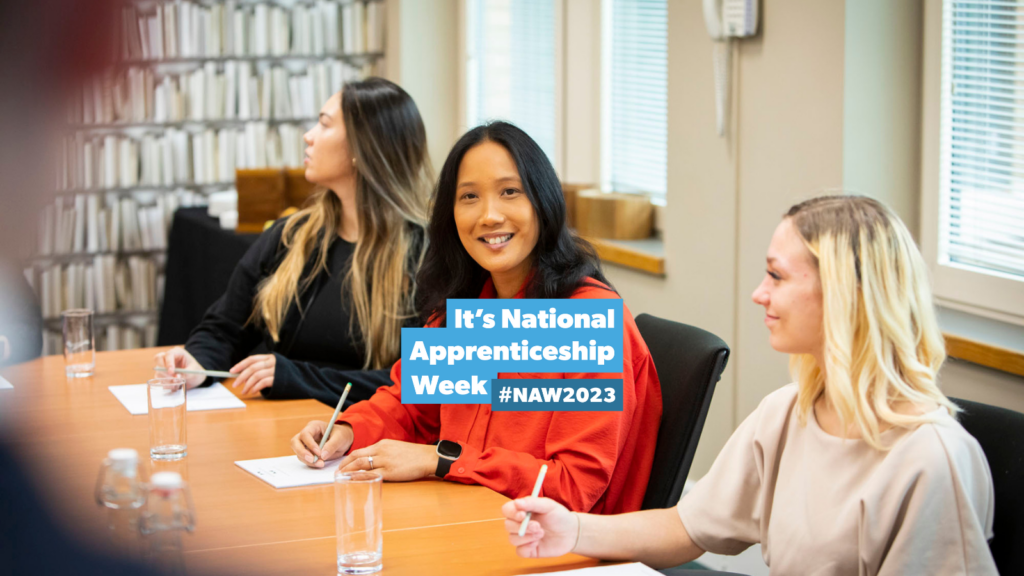
National Apprenticeship Week 2023
In National Apprenticeship Week we talk to Joanne Barratt, Managing Director, The Venues Collection and Lime Venue Portfolio about the evolving role of apprenticeships within the events industry – and their value for the next generation of event professionals.
How has the apprenticeship landscape changed?
General awareness of apprenticeships is growing within our industry. Both the Government and individual companies are behind these schemes but also it seems that ‘A’ Level students are taking them more seriously. The old stigmas attached to apprenticeships are fading: whereas the historical mindset was: “I’ve not done very well with my GCSEs – so I could fall back on doing an apprenticeship”, the prospect of a future burdened by university debt is prompting many school leavers to look more seriously at the alternatives.
What kind of roles are prime for apprenticeships?
For us, the obvious candidates for apprenticeships have always been chefs but there’s more available now in our events departments: in sales and marketing, and finance. In addition to vocational functions; there is more focus now on skillsets.
Entry is not just restricted to the 17-18 year-olds: we have a regional manager who wants to do an MBA, and this can be arranged through the Apprenticeship Scheme. We’re seeing that apprenticeships have been extended to many more functions – not every single role, but certainly different levels of that function.
Our own Executive Chef, Sam Morgan is currently taking part in a culinary training programme, developed by Compass Group in collaboration the Michelin-starred chef, Marcus Wareing. Called ‘Forward with Marcus Wareing’ it runs alongside a Level 4 Senior Culinary Chef or Level 5 Operations Departmental Manager apprenticeship standard. It’s being delivered in partnership with the national hospitality training provider, HIT Training and is designed to build skills, grow knowledge and expand imagination.
Do you see any challenges for potential apprentices?
Many young people don’t yet know what they want to do and are frightened to make what they see as a career commitment. This hasn’t been helped by the fact that the current 17–18-year-olds missed out on early part-time jobs during the two Covid years, so they haven’t even had a chance to get any work experience.
They are understandably hesitant to embark on a path leading to a job that’s not right for them. They’re nervous about committing to a ‘job for life’.
Can employers do anything to overcome this barrier?
I think we need to change the mindset. An apprenticeship could lead to a job for life – but it doesn’t have to. It can be used as a stepping-stone to something else. For example, if someone starts off doing event sales but later thinks they’d actually prefer to do operations, they can move across. The apprenticeship will have shown them other parts of the business and helped them become a more rounded employee? Many of the skills they will learn, particularly here in the events industry, such as finance and marketing, are useful transferrable skills. They can move around within an organisation – or within the industry.
What are the benefits to the employer of offering apprenticeships?
We get the buy-in from that individual. Doing an apprenticeship will make them a more rounded individual and hopefully more committed to the organisation. With all the current economic uncertainties, people are happier to be in jobs that are helping them build their careers, rather than jumping ship and losing job security. Both employer and employee want to have something that keeps them in the business.
Is there still a stigma around not having a degree?
In some professions a degree will always be necessary but we’re a people industry – we always say: “Hire the smile, train the skill”. It’s true that some people who haven’t had an academic background may struggle in certain areas, but we can train them in things like report writing or spreadsheets. But personality and attitude are critical. A brilliantly academic general manager is not much good if they can’t speak to a customer or a team member.
In areas like events sales, I would choose someone who’s got three years’ experience in the business over a graduate. We care most about how they can hold themselves in a conversation and what they can bring to the organisation.
Is there scope to improve the current apprenticeship system?
At the moment, candidates need to have passed English and Maths GCSE to qualify for an apprenticeship place. I can understand why, and yet we know now that some people are just not good at sitting exams. We could be missing out on a group of people who could otherwise make a great contribution to our industry. With all the awareness now of neurodiversity and inclusivity, it seems that Government policy-making is slightly lagging behind here because meanwhile, the events industry is struggling to fill vacancies. I’d like to think that this will change, because for our industry it’s all about human interaction.
Government policy also needs to change to allow employers more flexibility to use their apprenticeship levy to support non- apprenticeship qualifications and short courses too – such as ESOL, Functional Skills, IT/Digital and sustainability qualifications.
Go back to other articles

